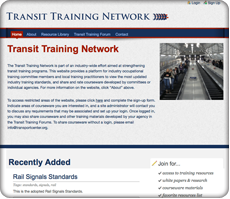Training, Apprenticeship and Career Ladders
Improve skills of your existing workforce and new hires and move them up career ladders
The Transportation Learning Center can help your agency put a training apprenticeship, or career ladders program in place that:
- Will be embraced by employees and supervisors
- Lead to quantifiable improvements in employee knowledge and skills
- Increase on-time performance and reliability
- Decrease liability by increasing safety for workers and patrons
To address the looming workforce challenges the transit industry faces, the Center brings labor and management together to develop productive solutions addressing their training needs: apprenticeship programs, mentoring and credentialing.
Apprenticeship programs benefit both employers and their workers. Quality training programs provide employers with a steady supply of skilled labor, improved equipment reliability and safety, and a high return on investment. For workers, apprenticeships provide enhanced job security, an opportunity to upgrade or learn new skills, and a career ladder for advancement within the organization. With funding and technical assistance from the U.S. Department of Labor, Department of Transportation – Federal Transit Administration and the TRB/Transit Cooperative Research Program the Center has worked with local and national leaders to develop an industry-wide system of qualification that includes apprenticeship. The Center is now prepared to replicate this qualification model nation-wide.
Read MoreBefore you start devoting resources to training, you want to make sure that you will get the training you need.The Center always begins its work with with you by using tools for labor and management to develop data jointly on training needs.
Once you have identified specific skills gaps, you can design training to address these gaps.The Center has worked with management and labor subject matter experts over many years to develop standards for skills training. Each skills gap that you identify has a specific set of detailed learning objectives. Your training department can adapt these learning objectives into a training program for current maintenance employees to enhance their skills. With some changes, this training can offer career ladder training for cleaners and helpers.
As valuable as classroom training is, most learning about work occurs on the job.Skills that aren’t practices aren’t retained. On the job learning requires buy-in from all levels of the organization, and strong communication between training and operations. Trained and effective mentors provide one very effective way to ensure that what’s learned on the classroom is retained on the shop floor. The Center will help structure good On the Job Learning practices and a system for selecting and training mentors.
